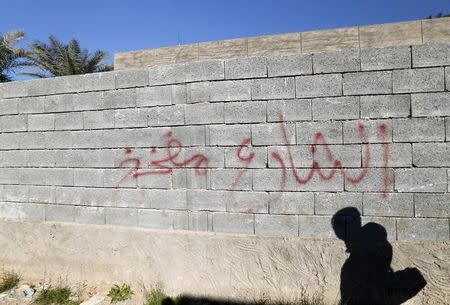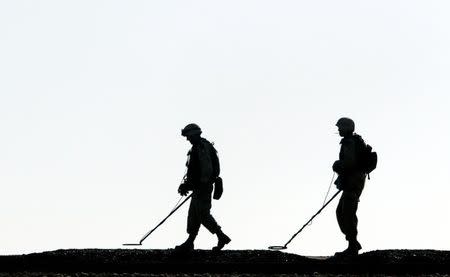U.S. firm to de-mine Iraqi city of Ramadi retaken from Islamic State
By Stephen Kalin BAGHDAD (Reuters) - A U.S. de-mining company is removing explosives and training Iraqis to dismantle the devices planted by Islamic State in the largest Iraqi city retaken from the militants, a diplomat and two U.S. officials said on Monday. Hundreds of improvised explosive devices (IEDs) planted throughout the streets and buildings of Ramadi, 100 km (60 miles) west of Baghdad, have delayed the return of around half a million displaced residents since the Iraqi military backed by U.S. air strikes recaptured the city three months ago. The United Nations and the governor of Anbar province, of which Ramadi is the capital, have said a shortage of Iraqi experts - military or civilian - trained in dismantling the explosives has slowed efforts to restore security. Several of the technicians have also been killed by snipers. The Iraqi government's strained finances have also limited its ability to secure and rebuild areas recaptured from Islamic State including the northern cities of Tikrit, Baiji and Sinjar. De-mining will be a critical first step in returning civilians to most of these areas. The United States said on Monday it was allocating $5 million for the contract with Tennessee-based Sterling Global Operations Inc., which bills itself as "the largest commercial munitions management and de-mining company in the world". A U.S. official told Reuters that Norway also had agreed to kick in $5 million and another $5 million was expected to come from other partners in the U.S.-led coalition battling Islamic State in Iraq and neighboring Syria. A Sterling official did not return requests for comment. A senior diplomat in Baghdad confirmed the contract, adding that both Iraqi and foreign nationals would be engaged in de-mining activities. It was not clear which countries the foreigners will come from. Coalition advisers supporting Iraq's military did not set foot in Ramadi during the months-long battle to recapture it. A spokesman for the coalition said its forces would not be involved in protecting Sterling's teams, which are expected to comprise around 40 individuals. A team of international experts arrived in Ramadi last week and conducted reconnaissance, according to Anbar Governor Sohaib al-Rawi. About 3,000 families returned over the weekend to districts that have been cleared of mines and explosives. But they are relying on electricity generators and water pumped from the nearby Euphrates River since public services have not been repaired. (Reporting by Stephen Kalin; Editing by Mark Heinrich)


